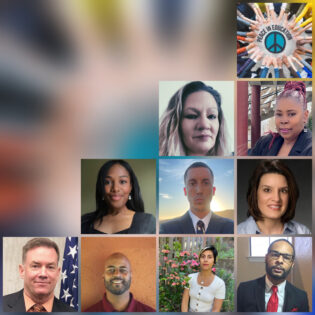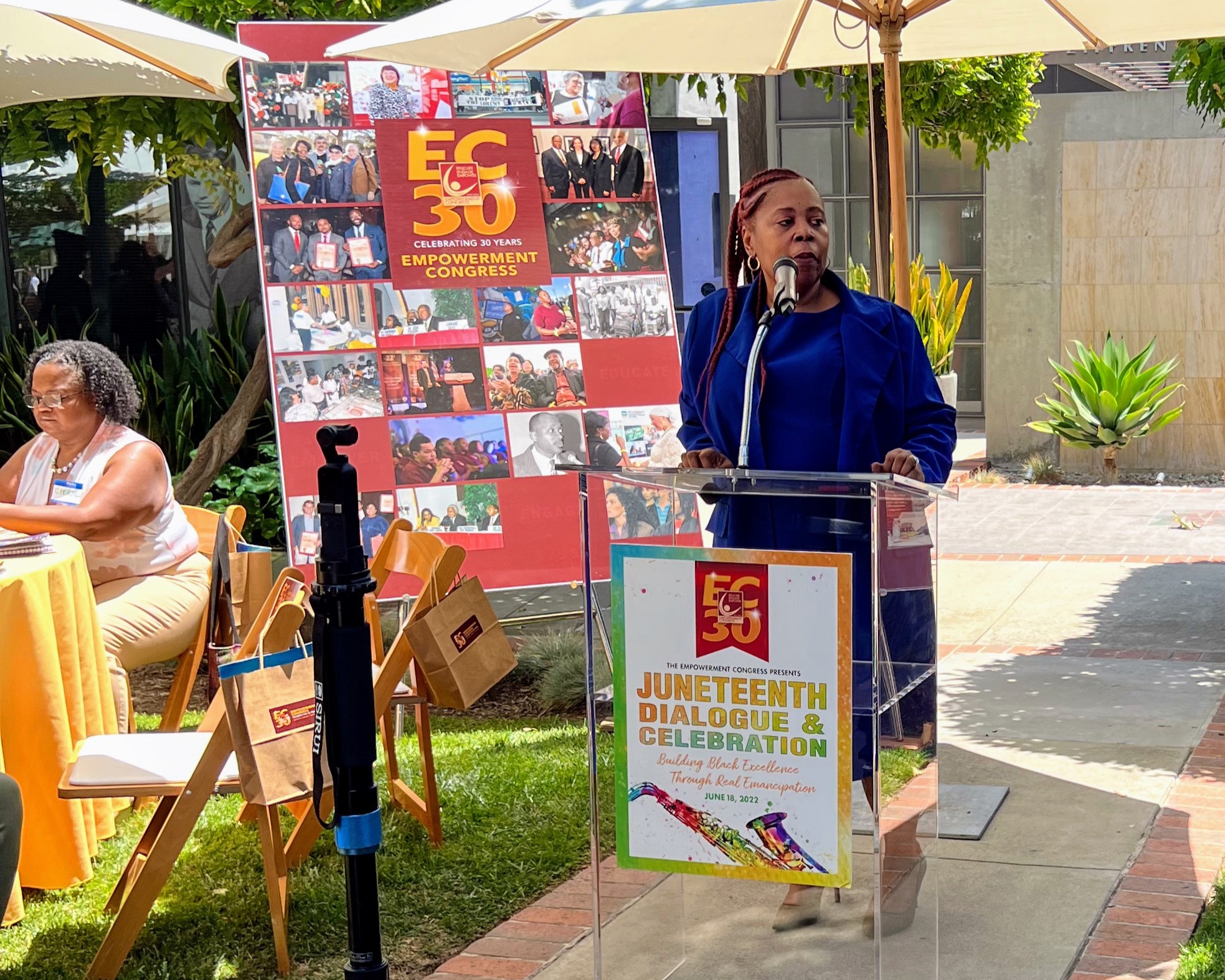Renata Valree speaking at the 2022 Empowerment Congress Juneteenth Dialogue and Celebration event on June 18. Photo Courtesy of Renata Valree
By Leah Quintero, Managing Editor
Renata Valree sits in a room, her red hair, orange blouse and proud smile as she speaks with her colleagues. She brightens up the atmosphere even through a computer screen. She’s surrounded by blue walls, a color that symbolizes hope, peace, and healing all of which she embodies and instills into the organization Peace In Education (PIE).
Valree is an adjunct professor in the Negotiation, Conflict Resolution and Peacebuilding Department at California State University Dominguez Hills, and according to Tina Coil, director and strategic planner of PIE, she is also, “the heart of this organization.”
She has over 25 years of practice in community mediation, which has allowed her to foster PIE’s vision to support underrepresented communities and give them agency over decisions that impact their lives.
For the past two years, PIE has been tackling this vision head-on.
The organization was founded in 2020 by Julie Ali, the assistant executive director, Coil, Paradis Harirchian, director of volunteer services, Shareef Valentine, director of strategic partnerships, and Nekia Prescott Horton, social media director.
After the news of George Floyd’s murder flooded the globe, grief, fear and uncertainty erupted in several communities. Valree, felt a switch go off inside her. The community needed help learning how to speak up about their wants and needs. Having the knowledge of how to facilitate a way for community members to use their voices, she went to work.
“[Valree] came on board as a professor and she had sent a message around [asking if] anybody wanted to help,” Ali said. “Around that time a lot of us were a part of the [Negotiation, Conflict Resolution and Peacebuilding] graduate program at CSUDH.”
For this to have begun and grown with the support of the Negotiation, Conflict Resolution and Peacebuilding program (NCPR), various CSUDH professors, and the enthusiasm of graduate and undergraduate students alike, Coil said, “There’s no better university.”
At the time she reached out to students, Valree had been working with L.A. County Supervisor Kathryn Barger, to find a way to address pressing issues that included policing in the community and having a safe space to have discourse. PIE helped them achieve this through open dialogue.
“A few of us volunteered to help with that and facilitate those conversations,” Ali recalled. “And [afterward] we were hooked.”
After helping with that project, no one wanted to end just there. It wasn’t a positive time in the world, according to Ali. Giving back to the community, and seeing people from all walks of life come together through this project, gave each of the founding members’ hope. They grew their team by recruiting Scott James as the director of training, Thomas Salmon as director of business affairs, and David Ervin as the director of data analysis.
“There’s always going to be a place where conflict exists and so as long as that’s happening, there needs to be a place where dialogues can be effectively held,” James said. “[We’re] the team that can answer that.”
With the growth of PIE, came the opportunity to apply for grants with the Jams Foundation, a non-profit created to provide financial assistance for conflict resolution initiatives, and the National Association for Community Mediation, a hub that supports peacemakers’ mission to advance the work of community mediation.
After months of waiting with their fingers crossed, they received the grant, allowing them to further their reach and expand the team.
“Shortly after that, we presented at the [American Bar Association] Conference, so that was a big deal for us being such a young non-profit to be able to present,” Coil said.

Continuing to Move Mountains
PIE’s first-ever formal partnership was with Black Women for Positive Change, whose goal is to produce socially responsible media tools to educate youth and adults about violence prevention.
This recognition made projects like the Compton Health Equity project possible after PIE learned that the community lacked medical resources. Compton residents had no access to healthcare, no public hospital in a five-mile radius, and according to Valree, they live 11 years less than members of any other community in L.A. County.
“We worked on that [project] for a year. It was [like] pulling teeth trying to bring a community together when they felt marginalized, they felt undervalued, and then they had community leaders who just didn’t show up at all,” Valree said. “Compared to all of the cities in LA County, Compton has the worst health outcomes. They have the highest cancer rate and the highest asthma rate. The highest infant mortality rate and overall life expectancy.”
To begin, the PIE team had to interview local organizations to understand what it was they needed, and then find community leaders willing to make the necessary changes happen.
“I don’t think people recognize that [PIE] is really [about] employing mediation, facilitation, training. We’re using all of those different skill sets, all of those different processes, to integrate change wherever [and] whenever the need arises,” Valree said.
Getting to the point where they are able to create these open dialogues and figure out solutions for communities like Compton hasn’t been smooth sailing.
“We had to build the trust in the community,” Ali said. “I think the key is that what comes out of this project isn’t about going in there and telling people how to change their lives and their outcomes. We are helping them through these facilitated conversations and organizing things like this to help them do it themselves.”
More projects have since developed, including the Reimagining Education Post-Pandemic series, the summit for Black Women for Positive Change, and the California Association of Youth Court Summit. PIE hasn’t cooled down since it began, and don’t plan on it.
As a non-profit, PIE relies on volunteers, and those interested can contact Valree. “We can’t do this work without the volunteers. We’re a core team but we can’t be everywhere,” Valree said. “A team collaborative effort, that’s what community mediation is.”
On Dec. 3, PIE will be holding their Days of Dialogue: Exploring Racism, Gun Violence and Policing in America and encourages anyone to rsvp to learn more.

